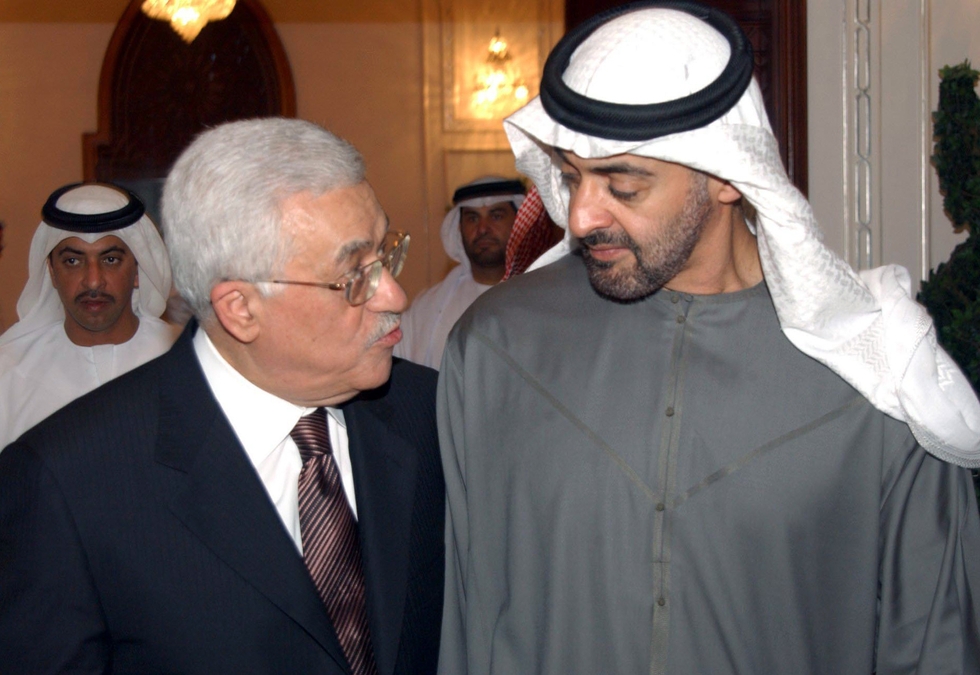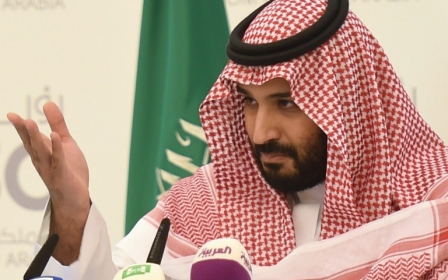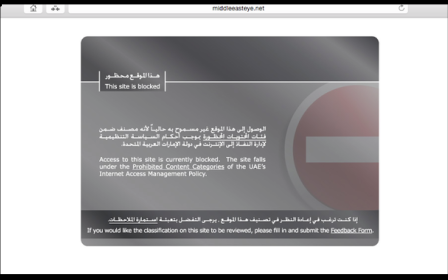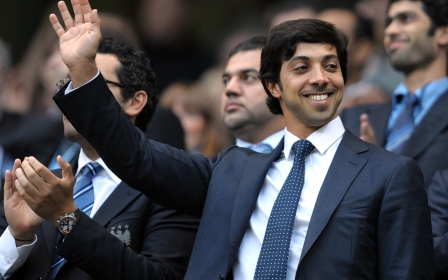REVEALED: How Palestinian president made an enemy of the UAE

An escalating five-year row between the United Arab Emirates and Palestinian President Mahmoud Abbas is behind the Gulf state's recent decision to withhold hundreds of millions of dollars from the Palestinian Authority, Middle East Eye can reveal.
Lebanese columnist Jihad al-Khazen published an interview in June with an unidentified Gulf official who described the PA as a “hodgepodge of failure and corruption” and called on it to resign.
A source close to Khazen told MEE on condition of anonymity that the Gulf official was Abu Dhabi Crown Prince Mohammed bin Zayed al-Nahyan – a claim also made by official Palestinian news agency WAFA.
Bin Zayed told Khazen that the UAE had given the authority $500m every year for four years and that he had “personally wore a badge bearing the Palestinian keffiyeh (scarf) as a symbol of solidarity”.
But this funding has recently been stopped because of an escalating row between Bin Zayed and Abbas, which has seen former PA prime minister Salam Fayyad investigated for alleged money laundering over his financial links with the UAE.
In June last year, the Palestinian attorney general, Abdul Ghani Oweiwi, ordered a $700,000 donation from the UAE be confiscated from Palestine Tomorrow for Social Development - a development organisation founded by Fayyad that seeks to alleviate poverty in the occupied West Bank.
Fayyad was accused of money laundering and using Emirati money for political purposes as part of a soft coup to overthrow the PA’s leadership.
However, a month after the donation was confiscated, the Palestinian Supreme Court ordered it to be returned to the former prime minister’s organisation.
Despite the money being returned, Bin Zayed has not forgiven Abbas and he, according to Khazen, is demanding the Palestinian president publicly apologise for the allegations made against Fayyad and the UAE.
“Do you believe the UAE would choose to launder through Palestine, and that amount would be just $700,00?” the Crown Prince told Khazen, who said the UAE leader spoke “with his anger plain to see”.
Bin Zayed said Abu Dhabi has given $10m to Fayyad’s organisation, which he established after resigning as prime minister in June 2013.
The Emirati royal went on to say that the PA “in its entirety must resign, as there is no trust in it”.
At the root of the row between Bin Zayed and Abbas is exiled former Fatah official Mohammed Dahlan, who was expelled from the Palestinian president’s movement in June 2011 after being accused repeatedly of murdering the late Palestinian leader Yasser Arafat.
Dahlan moved to the UAE after his expulsion where he works as an adviser to Bin Zayed, with who he has built a close personal and professional relationship.
A source close to Dahlan told MEE the Palestinian has impressed Bin Zayed with his “intelligence and ability” and also his “good relationship with the Israelis”.
However, before Dahlan’s UAE move, Bin Zayed attempted to stop Abbas from expelling him and instead urged the Palestinian president to heal the rift.
In a trip to Abu Dhabi in 2011, Abbas promised Bin Zayed he would solve the disagreement with Dahlan and that he would not expel him, a senior Palestinian source told MEE.
But when Abbas returned to the West Bank he went back on his word and threw Dahlan out of Fatah.
“[Bin Zayed] reacted angrily,” the Palestinian source said. “He said Abbas is not a man, has no dignity or respect, and that it was over between them. He told Dahlan that the UAE was now his country.”
In an attempt to avoid making a powerful enemy, Abbas tried to mediate with Bin Zayed through his son Yasser, who he sent to Abu Dhabi to try and convince the Emiratis that they should not give Dahlan refuge.
These attempts proved futile and Bin Zayed told Yasser Abbas to return home and tell his father: “Look boy, the home of Zayed is the home of all Arabs. Go and tell your father this.”
After Yasser Abbas was sent home, Dahlan quickly made Abu Dhabi his home and over the course of the past five years he has been allowed access to the UAE’s sizeable financial coffers, which he has used to build influence back at home in the Occupied Palestinian Territories.
A senior Hamas source told MEE that in 2014 and 2015 Dahlan spent $25m in Gaza. The money, the source said, has been used to support families who lost relatives in Israel’s 2014 assault on Gaza as well as to pay for mass weddings.
When asked why Hamas would allow Dahlan – a long-time opponent of their Islamist movement – to operate in Gaza the source said: “There are two reasons: The first is that we are poor and the second is to provoke Abbas.”
Abbas has been in open conflict with Hamas since 2007, after the latter defeated the former’s Fatah movement in the previous year’s general election, leading to violence between the two groups causing a political split that continues to be unresolved.
Dahlan has also been spending an unknown amount of money in the West Bank, principally in refugee camps, where he has been building support for a long suspected bid to be the next Palestinian president.
A source close to Dahlan said he has constructed a parallel Fatah leadership system in the West Bank that mirrors the movement’s organisational structure.
He chairs the “system within a system” and personally oversees an 18-person revolutionary council. Local branches based in refugee camps operate under the council, electing their own leaders and possessing a budget provided by Dahlan.
This structure is being developed in preparation for Dahlan’s plans to eventually return home and takeover from Abbas, the source said.
“He wants to be president. Dahlan said ‘I come next but not immediately’. He thinks there should be an interim leader who will quickly hand over power to him,” the source said.
Dahlan’s ability to spend large sums of money in poor Palestinian communities has allowed him to build significant public support, but his increasingly powerful position was far from inevitable.
The source close to Dahlan said when he was expelled in 2011, he was not in a strong position, and that in expelling him Abbas made his enemy stronger than he was likely to have ever become.
“Dahlan was helpless, he was a wounded lion,” the source said. “When he was kicked out [of the West Bank] he had been marginalised.”
However, since 2011, Dahlan has transformed into one of the most influential power brokers in the region, advising the UAE on how to “make money and grow their influence”.
Dahlan’s ever increasing power has bred a sense of paranoia in Abbas, who now sees his enemy’s influence everywhere he turns. And wherever he sees Dahlan plotting he also believes he sees Emirati money.
The accusations against Fayyad were not surprising to those aware that the former Palestinian prime minister is known to have a good relationship with Dahlan – although multiple sources told MEE that Fayyad is not part of any claimed plot against the PA.
“But Abbas thinks Fayyad is Dahlan’s man,” the source close to Dahlan said. “This problem with the UAE is personal for Abbas. He sees anyone with ties to the UAE as his enemy.”
Another prominent Palestinian official who has fallen foul of Abbas’ spat with the UAE is former Palestinian Liberation Organisation (PLO) Secretary-General Yasser Yasser Abed Rabbo.
Rabbo was sacked from his position in June last year, accused in private by Abbas of disappearing for a month to go to the UAE, where the president believes he was conspiring with Bin Zayed against the PA.
“But Rabbo wasn’t in the UAE, he was on a Greek island with his family,” said a source close to the former PLO secretary-general.
In June, Fatah demanded that Bin Zayed take a “clear position” on Khazen article, but the Abu Dhabi leader has not commented on it.
Dahlan, Fayyad, and Rabbo all declined to comment on this article. Several aides to Abbas said they would not comment on the spat, arguing that anything they might say would “only make the situation worse”.
However, Fatah official Muwaffaq Matter recently told Al Monitor that Dahlan has been seeking to cause problems between the PA and the UAE since his move to Abu Dhabi.
“We are not concerned with any dispute with any Arab country,” the Fatah Revolutionary Council member said.
“However, Dahlan – who serves as a security consultant in the UAE, which contributed to strengthening his ties with Egypt – has been seeking, since he sought refuge to the UAE, to stir sedition between the PA leadership and the Arab countries, namely the UAE.”
This article is available in French on Middle East Eye French edition.
New MEE newsletter: Jerusalem Dispatch
Sign up to get the latest insights and analysis on Israel-Palestine, alongside Turkey Unpacked and other MEE newsletters
Middle East Eye delivers independent and unrivalled coverage and analysis of the Middle East, North Africa and beyond. To learn more about republishing this content and the associated fees, please fill out this form. More about MEE can be found here.




